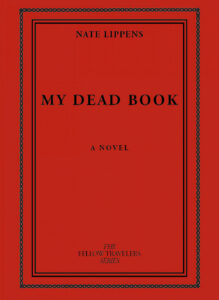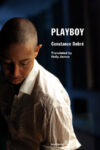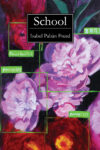
[Publication Studio; 2021]
“Why do we live here?” asks the narrator of My Dead Book before he clarifies. “I mean all of us and I mean anywhere.” Nate Lippens’s short, poetic novel, which is structured as a series of non-linear scenes from the life of a former gay hustler on the verge of turning fifty, is filled with quips and epigrams perfectly suited to the bleak hilarity and existential dread of 2022 and beyond. However, the book is not about COVID or global warming, but the narrator’s primary preoccupation, which — as the name of the book implies — is death.
An insomniac and an agoraphobe, he spends nights remembering a parade of dead friends and lovers, many killed by AIDS, many by suicide. None belonged to mainstream society, by any definition: “We were queer and we were on our own. Not much more to say. It was obvious.” As such, the book serves as a paean to life — and death — outside of the mainstream, which is an important topic as we confront with unprecedented certainty the death of the American Dream.
Whether the American Dream ever existed in the first place is debatable — particularly if you don’t aspire to look or act like Jeff Bezos or Elon Musk. But its death has been on our collective mind since at least 1969, when in the penultimate scene of Easy Rider, Peter Fonda mutters “we blew it” to Dennis Hopper, just before they hop on their motorcycles and are gunned down by rednecks, leaving the credits to roll over a smoldering wreck at the side of the road. Given that the narrator of My Dead Book was born in 1969 (more or less, we just know that he’s fiftyish), the book feels like a continuation or the culmination of the we-blew-it theme. The difference is that time is running out: soon enough, there won’t be anything left to blow.
For many, this new reality seems to be a shock. Last year’s most-read article in The New York Times was about “languishing,” a newly diagnosed mental state of “stagnation and emptiness” that doesn’t quite qualify as depression. I was surprised. Who were these legions of new languishers? Most of my friends had been openly languishing for years, if not decades.
But recently, I happened to catch the last scene of Don’t Look Up, in which Leonardo DiCaprio, surrounded by his wife, two sons, his research assistant, her boyfriend, and a token Black guy, gives a little chagrin-laced speech — “The thing of it is . . . we really did have everything, didn’t we? I mean, if you think about it” — seconds before the shock waves from a comet, which has already collided with Earth, blow them up. At this moment, it clicked: the people who look and act like Leonardo DiCaprio and his family are the ones upset by the death of the American Dream. They are the new languishers, bereft from saying goodbye to home ownership, two cars, a stable career, access to (good) healthcare, beach vacations, and so many more perquisites that they and their parents have taken for granted for generations. Even more alarming, it’s too late to do anything about it. It’s no wonder they are freaking out. They cannot see a life beyond this death.
Fortunately, My Dead Book serves as a guide for those making the transition from dreamer to languisher, which is not to say that they should expect a happy ending. Among the dead Lippens writes about is a fellow hustler who introduced the narrator to the trade as a teen, and with whom he fell in love as they turned tricks together. “To have survived,” the narrator says about his dead lover, “to have started over again and again, then crowning fifty to have killed himself, was cruel. I want to say I can’t understand. I want to say it’s senseless, but I do understand and sometimes it makes more sense than not.” The narrator, like his lover, has suffered through a lifetime of homophobia, its concomitant marginalization and poverty. And now, growing old, all of this makes the temptation to end his life seem reasonable. These forces are too overwhelming to fight, so what’s the point in trying?
The narrator describes his own life as ghostly and discarnate. He has little money and spends weeks without leaving his rural Wisconsin apartment, where he now lives after fleeing New York City. He remembers telling a friend that he was planning to move back to the Midwest, and the friend responded, “‘How long have you been feeling suicidal?’”
But for those like the narrator who can hang on, all is not so dire. While he knows that he has aged out cultural relevance — “welcome to curmudgeonhood,” he notes when turning fifty — he embraces the many regrets about his life. “Well, hello, remorse,” he says, “we were never formally introduced.” He is also sustained by bitterness. “Bitter is what stupid people call you when you won’t tolerate their bullshit,” he says while describing the monolithic homophobia that has defined his relationship to the mainstream. This anger goes back to a pride march he attended in Iowa in 1988, where he was dismayed by the “groups of moms not discouraging their young kids from throwing rocks at us, but rather laughing about it, and several guys hanging out on a small, flatbed truck brandishing baseball bats, shouting ‘Go home, faggots.’”
For Lippens, society does not “get better.” Not long before the narrator turns fifty, he goes to a bar and listens to the local men, who are using slurs. The narrator observes that “It wouldn’t matter what else happened in the world or didn’t, these men and men like them would always sit in taverns — different songs with the same twang, different taxidermy, different posturing — and talk this way.” While the narrator’s anger in My Dead Book doesn’t lead to social or political change, it’s still critical to his trajectory and ours. Unlike most anger we find in fiction, there’s no resolution or redemption. Instead of changing society, he leaves it, which offers its own validation. Soon enough, we’ll all have to leave because you can’t live in something that’s dead.
My Dead Book should be a model for other entertainment, which is often too saturated with denial to be believed, even as a distraction. I would like to ask my fellow gays especially to please stop pretending that the American Dream is alive and prospering, much less welcoming. Instead, acknowledge its implicit hostility to our existence and its impending death. This means disavowing the “we’re all in this together” messaging of popular gay shows like Queer Eye or assimilation propaganda like Single All the Way, a recent gay entry into the holiday rom-com genre. There’s no point in being honest about your sexual desires if you’re aspiring to live in a world suffocating with lies.
In Homos, Leo Bersani’s 1995 formulation of the antisocial thesis, he wrote that “the most politically disruptive aspect of the homo-ness . . . in gay desire is a redefinition of sociality so radical that it may appear to require a provisional withdrawal from relationality itself.” In My Dead Book, these words seem prophetic when Lippens writes about community: “I wasn’t looking for community,” says the narrator. “Community was a group of people figuring out how you didn’t belong.” If the pandemic has taught us anything, it’s that there’s bliss to be found from removing ourselves as much as possible from “normal” society. For gays and nongays alike who have identified themselves as languishing, you can be reassured that the death of the American Dream does not mean the end of all life, but the end of the profit-driven death culture that has delivered us headfirst into our burning oven of a planet.
So what’s next? Lippens doesn’t reflect on the future, but he offers a few clues about what those of us who don’t die or kill ourselves might expect. There’s a lovely scene in My Dead Book where the narrator remembers visiting a patch of old-growth forest where the trees have survived thanks to a mistake by the original surveyors of the land. It is in these pockets of life, overlooked or abandoned by the relentless American Dream, that outsiders have always survived, hidden and ghostlike. The narrator describes his dead lesbian friend who took him to the forest. “Let’s get lost,” she says, which in 2022 are words to live by.
Matthew Gallaway lives in New York City and is the author of #gods.
This post may contain affiliate links.







